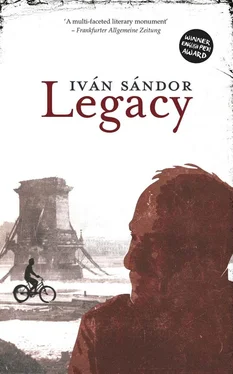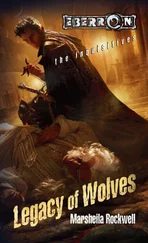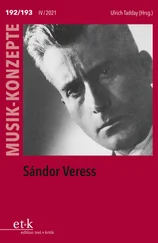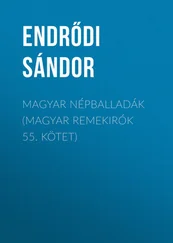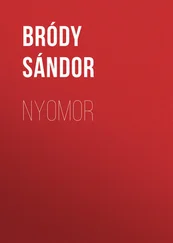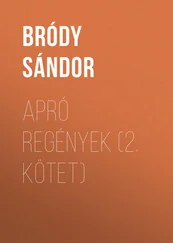We wait until evening, when we open one of the cans of meat. We still have some dry bread. At dusk I put on the knapsack. Vera is carrying her little suitcase. Mrs Ulbert says farewell, making a sign of the cross.
On Francia Road there is only a pavement on the side with housing; on the other side is a railway embankment. A single street lamp is the only lighting. Coming the other way, from Thököly Road, a pair of Arrow Cross men on patrol is approaching. We cannot turn back now. We have no papers; I grip Vera by the hand. They are twenty metres away. I put an arm round her; from the way she snuggles up to me I can sense that she had understood we had to go straight ahead. Ten metres. The street lamp is now shining from behind the two men with their submachine guns, so I was unable to get a clear view of their faces. Their hands are on the stocks of their guns; they are walking in step. I press Vera to the wall, press close against her and throw my right hand up high, shouting, Long live Szálasi!
There is no lamp behind us, so it could be that only now do they notice us. Vera embraces me, thrusting her head to my neck. Can’t you find a better place to snog, boy? He can only be just two or three years older than me, but he chuckles immoderately at his own wit.
We reach the lamp.
Vera is unable to go any further, but I can’t allow her to stop.
In the distance is the rattling of a tram. The iron grille over the front of Mr Zsilka’s hairdressing salon, on the corner of Thököly Road and Hermina Road, has been pulled down. I had not seen the spire of St Domonkos Church look so high before; the entrance to the Glória Cinema is dark as there is no late-night showing.
I turn into St Domonkos Street on Thököly Road. On the corner of Abonyi Street, which runs parallel to Thököly Road, and András Cházár Street is the Budapest Jewish Grammar School. The school-yard lies beyond the cast-iron gate of the driveway. I point out to Vera from the street where the nets and backboards for the basketball court are. We used to go into the gym along a corridor in the basement, but there is also a door opening on to the yard, and when the weather was fine we would run about outside, plimsolls, satin shorts and a white or blue singlet. I tell Vera that the gym floor had sawdust sprinkled over it, so if anyone fell over they did not hurt themselves, but on the other hand balls did not bounce very well.
At the St Domonkos Street Grammar School they attempted to provide protection for two thousand persons. It was barely possible to move around. There were eighty of us confined in the cellar; we slept on the floors without any blankets. On one occasion the Arrow Crossers dragged off 150 people and vowed that we would be next. Each and every time we heard footsteps approaching we thought it was our turn. Mother could take it no longer; one day she went out in order to find a hiding place somewhere else. Arrow Crossers gunned her down in the street in front of the school.
This letter of recollections I put in one of my folders.
I am unaware that behind the locked gates the men who can be seen in the dim light in the hall are member of a guard organized after the 150 persons had been dragged away the previous day.
The park is covered in snow.
Nearby bursts of submachine-gun fire can be heard, with cannons in the distance.
We reach Aréna Road. German tanks are rattling towards Hősök Square.
I later find out that Mrs Manntz’s husband deserted from his unit and he gets home the very night that Vera and I are slinking along Aréna Road.
Sergeant-Major Manntz throws off his sopping-wet overcoat and steps into the bedroom. He goes back into the kitchen and is just reaching for the big carving knife when Major Dr Baron Helmut von Friedenburg shoots twice through the open kitchen doorway. They bury the sergeant-major in the garden. There are many bodies buried in gardens.
Submachine-gun bursts can be heard from the direction of Hősök Square.
Vera does not dare come out from the cover of the trees in City Park.
We wait.
A cloud floats across the moon.
Not one streetlight is shining in Délibáb Street, just off to the right near the top of Andrássy Avenue. There is a Red Cross sign on the gate of number 4 Mihály Munkácsy Street. The door is opened after three raps. An enormous hallway with staircases winding upwards on either side to the mezzanine. We are led into one of the rooms. A writing desk, cabinet, three chairs. A woman of around forty in a dressing-gown comes in. She writes down our names, dates of birth, parents, home addresses. On being asked I say that I last saw my parents at the Óbuda Brickworks, but I had been told that the Red Cross had brought them back from Hegyeshalom, that they were in Alice Weiss Hospital and they got a message to me that we should come here.
Vera stays quiet. Her mother had been taken away in the same column as my parents, I say, but we had heard nothing about her; her father was in a forced-labour brigade, and nothing had been heard about him either.
The woman, holding her by the hand, takes her away. She returns five minutes later and we go up to the first floor. The corridor is deserted. I ask where Vera went: to the girls on the second floor. I shouldn’t worry, she’s in a comfortable spot. She tries two doors. At the third she is told there are eleven there. This is fine, she says. I should try to get some sleep; don’t pay attention to anyone. You’ll have time tomorrow to see who to make friends with.
The room is dark and stinks. No one budges. The woman repeats sharply that a palliasse is to be freed up for me. She runs a torch beam over the floor. The boys are sleeping tightly packed next to each other. I don’t know how I shall be able to find a place. She orders two of the boys to shove up closer to each other. I find a blanket under the window and wedge myself between two bodies. I hear a voice every hour and later I learn that was the room’s senior. Left! Right! Everyone turn together! There are some who only wake up if the boy next to them is breathing in their face.
I wake up to a rattling of mess tins. There is a long queue in the corridor. A ladleful of tea poured into the mess tin and a round of bread. Some of the boys go back into the room and have their breakfast sitting on their palliasse, but most of them squat in the corridor or lean on the wall. I choose to sit on my palliasse. I tell the boy next to me my name and ask him how I might be able to meet Vera. He says that there is a glass door at this end of the second-floor corridor; I can rap on that, but it won’t do any good; they’ll not let me in. I go upstairs and knock on the door. A young woman with a white headscarf opens the locked door. It’s not allowed, she says gently, meanwhile scanning me at length; you know, not all the boys are as decent as you are. She will tell Vera that I came. Come back just before supper time.
There are twelve of us in the room, which must be about five by three metres in size. One of the boys is sewing his trousers, which have split along one of the seams; a second is collecting dirty underclothes, shoving them into a white linen bag. I had a similar sports bag, containing my gym shoes and kit, which was tied to my school satchel. A stubble-jawed, lanky, cross-eyed boy is slumped against one of the walls, yelling and giving every appearance of masturbating, one of his hands clutched over the buttoned-up fly of his trousers, his tongue hanging and panting, but he is more likely laughing. A little boy of six or seven is watching him engrossed, as it he were gazing at a clown in a circus.
A bespectacled boy comes over, perhaps older than me. He tells me his name and puts his hand out. The name is familiar; I seem to remember hearing it from Father. His father was also a paperman (that’s the word he uses) with a workshop in the VIth District, a few streets away in Szív Street. He introduces me to his younger brother. We agree that I should carry my blanket and headrest (my haversack) across next to where they are lying; they, too, reckon our parents must know each other — they’re the Riegler boys.
Читать дальше
